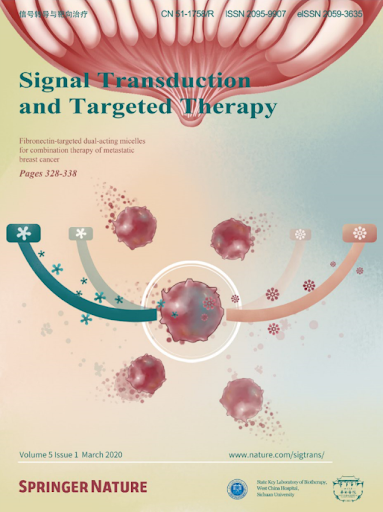GPR15 differentially regulates the effects of cigarette smoke exposure on Crohn's disease and ulcerative colitis.
IF 52.7
1区 医学
Q1 BIOCHEMISTRY & MOLECULAR BIOLOGY
引用次数: 0
Abstract
Inflammatory bowel disease (IBD), which includes Crohn's disease (CD) and ulcerative colitis (UC), is a chronic disorder characterized by gastrointestinal inflammation. Cigarette smoke is a well-established risk factor for the development and exacerbation of CD while exerting a paradoxical protective effect against the onset of UC. The exact mechanisms by which cigarette smoke influences IBD, as well as the opposite effects in UC and CD, have long remained unexplained. Here, we demonstrated the detrimental impact of cigarette smoke on CD progression while highlighting its beneficial effects on UC, as evidenced by analyses of human sample data. Mouse models of CD and UC exposed to cigarette smoke presented phenotypes consistent with those observed in human disease. GPR15, previously reported to direct regulatory T (Treg) cell colon homing, was upregulated in the colon tissues of both chemically induced colitis models after smoke exposure. Importantly, Gpr15 deletion ameliorated smoke-induced CD while increasing UC severity in mice. Furthermore, our study revealed that cigarette smoke mediated GPR15 to amplify colonic T helper type 17 (Th17) cell populations, thereby worsening the adverse effects of smoking on CD in mouse models. Moreover, cigarette smoke induced an increase in Treg cells through GPR15, which contributed to mitigating its impact on UC in mouse models. Moreover, in cigarette smoke-exposed CD and UC model mice, C57BL/6JGpt-Tg (human GPR15) transgenic mice presented phenotypes opposite those of Gpr15-deficient mice. Overall, our study offers mechanistic insights into the role of cigarette smoke-induced GPR15+ T cells in mediating the divergent effects of smoking on UC and CD.GPR15不同程度地调节香烟烟雾暴露对克罗恩病和溃疡性结肠炎的影响。
炎症性肠病(IBD),包括克罗恩病(CD)和溃疡性结肠炎(UC),是一种以胃肠道炎症为特征的慢性疾病。吸烟是CD发展和恶化的一个公认的危险因素,同时对UC的发病有矛盾的保护作用。吸烟影响IBD的确切机制,以及UC和CD的相反作用,长期以来一直没有得到解释。在这里,我们通过对人类样本数据的分析证明了吸烟对CD进展的有害影响,同时强调了其对UC的有益影响。暴露于香烟烟雾的小鼠CD和UC模型所呈现的表型与在人类疾病中观察到的一致。GPR15,先前报道直接调节T (Treg)细胞结肠归巢,在烟雾暴露后两种化学诱导结肠炎模型的结肠组织中上调。重要的是,Gpr15缺失改善了烟雾诱导的CD,同时增加了小鼠UC的严重程度。此外,我们的研究表明,在小鼠模型中,香烟烟雾介导GPR15扩增结肠T辅助型17 (Th17)细胞群,从而加重吸烟对CD的不良影响。此外,香烟烟雾通过GPR15诱导Treg细胞增加,这有助于减轻其对小鼠UC模型的影响。此外,在香烟烟雾暴露的CD和UC模型小鼠中,C57BL/6JGpt-Tg(人GPR15)转基因小鼠表现出与GPR15缺陷小鼠相反的表型。总的来说,我们的研究为香烟烟雾诱导的GPR15+ T细胞在介导吸烟对UC和CD的不同影响中的作用提供了机制见解。
本文章由计算机程序翻译,如有差异,请以英文原文为准。
求助全文
约1分钟内获得全文
求助全文
来源期刊

Signal Transduction and Targeted Therapy
Biochemistry, Genetics and Molecular Biology-Genetics
CiteScore
44.50
自引率
1.50%
发文量
384
审稿时长
5 weeks
期刊介绍:
Signal Transduction and Targeted Therapy is an open access journal that focuses on timely publication of cutting-edge discoveries and advancements in basic science and clinical research related to signal transduction and targeted therapy.
Scope: The journal covers research on major human diseases, including, but not limited to:
Cancer,Cardiovascular diseases,Autoimmune diseases,Nervous system diseases.
 求助内容:
求助内容: 应助结果提醒方式:
应助结果提醒方式:


